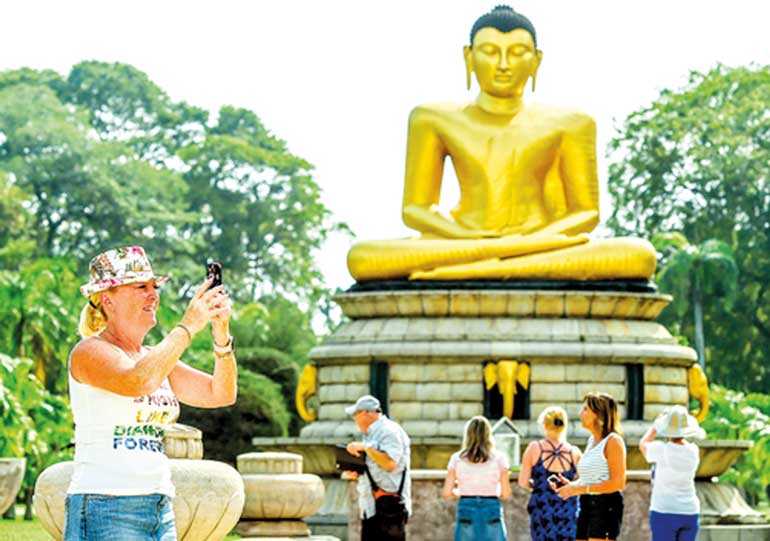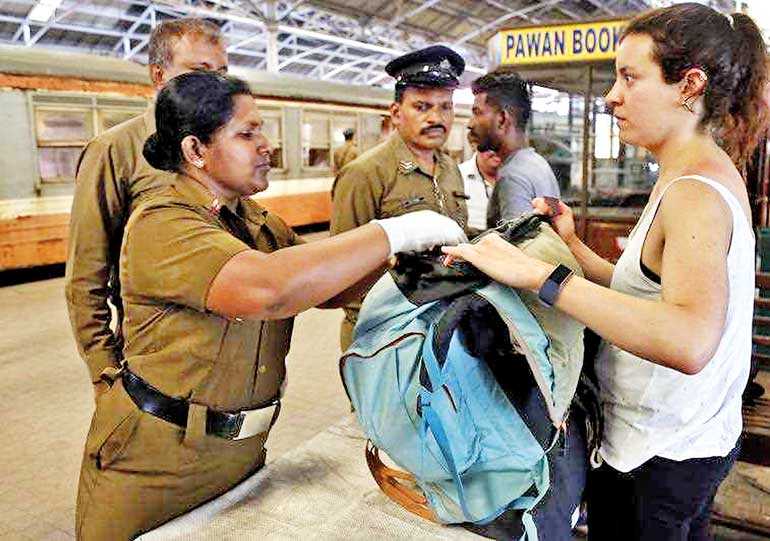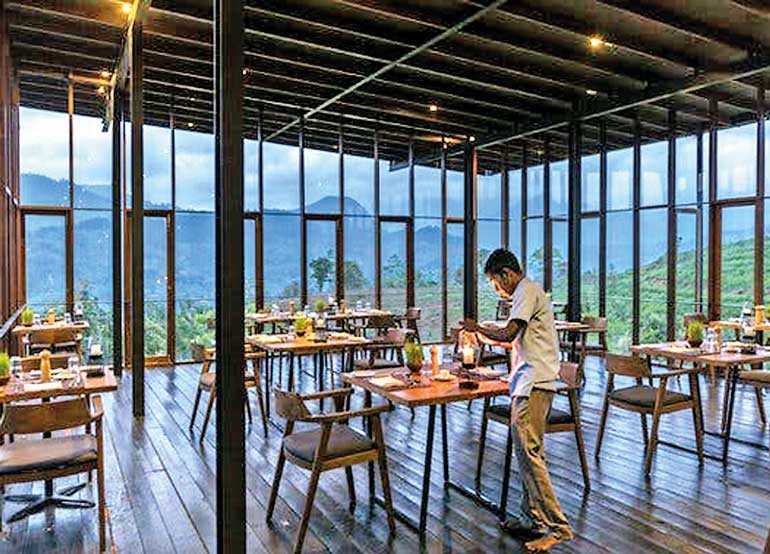Monday Feb 16, 2026
Monday Feb 16, 2026
Monday, 16 December 2019 00:55 - - {{hitsCtrl.values.hits}}



Scene 1: The plight of a mid-size hotel down south
It is a mid-size hotel facing the serene beaches of southern Sri Lanka. One wing of the hotel containing about 100 rooms has been permanently closed since the horrendous Easter bombings. Of the other wing, which also contains an equal number of rooms, a few have been occupied by foreign tourists. The pool is virtually empty. In the main dining room, there are more unoccupied tables than the few occupied ones. No luxury coaches waiting for tourists in the car park. One entrance to the hotel has been locked, presumably to save on the salaries of security officers.
When we chose that hotel for our annual convention, the management was eager to accommodate every little need of our party. In previous years, hotels normally allowed us only two rooms as changing rooms. This time, they had more rooms to spare and hence, four rooms were placed at our disposal. But the rooms were from the closed wing and gave an acrid smell as you entered them. After a bout of coughs and loosened sinuses, you could get used to the new unfriendly environment.
The management did not want to hide their concerns. “Around this time in previous years, we had always been overbooked,” one of the staff members told me, “But since May, even the booked ones have been cancelled. We get foreign tourists very rarely. That was why we had to close one wing altogether because we wanted to save the staff salaries and maintenance costs. We operate now with a minimum number of people.”
I asked him about other hotels along the beach. “They are also in the same plight as we are. The whole sector in this area is paralysed.” That hotel belonged to a business conglomerate and they have been able to run it at a loss by pumping money from other operations. But they will not be able to do for long. Once they come to their limit, the choice is to give up entirety of the $100 million investment.
Is Sri Lanka ready for this?

Scene 2: The cash-collector turned cab-driver
I met a middle aged cab-driver when I booked a cab. It was close to midnight, but he was ready to drive me to my destination. To keep the fellow from falling asleep, I struck a conversation which finally turned to his life, career and hopes.
“This is not my permanent job” he told me. “I was a collector of debt for a firm which supplied fruits and vegetables to tourist hotels all throughout the country. They had been given one month’s credit and my job was to visit them in person and collect it on the due dates. I had a base income which was low. My major income came from the commissions I got when I collected the dues from those hotels. Before the Easter bombings, it was a lucrative job because I was always able to collect the dues and earn handsome commissions.”
“What happened then?” I asked him.
“Everything changed after the Easter bombings. When I visited hotels in outstations, they came out with their own plight and even showed me the order books to prove their point. They did not have any cash to pay. First, they gave me post-dated cheques. When we banked those cheques, they were returned unpaid because those hotels had failed to deposit cash in their accounts. So, my collections went down and along with that my commissions too. I did not get enough money to maintain even myself, let alone my family. So I quit the cash-collecting job and got a friend’s vehicle to run this as a cab. I have to bear the fuel cost and meet out the charges to the cab company in addition to sharing 50% of the net revenue. So I have to work the whole day, whether it is sun or rain or day or night to make money. That is why I am working at this hour of the day,” He confessed. I asked him what happened to the firm he was working for. “It has stopped its operations,” he said.
The management did not want to hide their concerns. “Around this time in previous years, we had always been overbooked,” one of the staff members told me, “But since May, even the booked ones have been cancelled. We get foreign tourists very rarely. That was why we had to close one wing altogether because we wanted to save the staff salaries and maintenance costs. We operate now with a minimum number of people.”
Scene 3: The shattered dream of a young start-up entrepreneur
He was a young man who had passed out from university with flying colours, earning an honours degree in software engineering. After working for some time as the IT handyman for a bank, he thought of setting up his own business using his IT knowledge. He was joined in this enterprise by one of his friends who was also a computer geek like him.
They had developed a software package together and started a virtual office to offer online tourism services to foreigners. They were to connect interested tourists to tour operators who are already established and arrange hotel booking facilities. The business was good and the commissions earned from tour operators and hoteliers were thriving. Within a few months, the start-up business was outperforming their expectations. The monthly income was much more than what this handyman had earned from his bank.
But all of a sudden, it came to a standstill after the Easter bombings and the young man and his friend became jobless once again. The concerned mother brought the young man to me for advice. “What happened to your business?” I asked him.
“We were doing well because the tourism sector was booming. But after the Easter bombings, everyone got cold feet and even those who had made bookings earlier cancelled them. We didn’t get any online inquiries after that. The hotel sector was also doing badly and we were not alone. After about five months of waiting, since things didn’t improve, we closed the business.”
It was a pathetic story and nobody had expected such a fate for these young entrepreneurs. We discussed the possibility of them restarting the business. Given current conditions, we found that they could not think of a quick restart. It was decided to wait until the things would improve and in the interim, look for a job elsewhere.
Scene 4: The booming business of arranging tour operations for Sri Lankans in other countries
This was a group of retired teachers from a leading school in Colombo. They had been approached by a tour operator who had been arranging group pilgrimages to Myanmar. They had been told that the temples and pagodas in Myanmar are all covered with gold glistening in the sun so brightly that the onlookers got temporarily blinded. It was a ten day trip covering all the important temples in the country.
This group had just got some arrears from a pension adjustment and were with enough cash to spend. Thus, without any second thought, they could seal the trip with the operator. The group taken to Myanmar numbered about 30 at the cost of about $ 1000 per pax. They were taken to Myanmar via Bangkok in a budget airline which did not serve the passengers with meals and allowed a baggage weighing only 7kg. Whilst in Myanmar, they were taken in buses, put in shared accommodation and served with local food. It was a poor man’s operation and some got stomach ailments whilst travelling. When they returned, though exhausted, all these retired people were happy about the adventurous experience they had in Myanmar.
“Everything changed after the Easter bombings. When I visited hotels in outstations, they came out with their own plight and even showed me the order books to prove their point. They did not have any cash to pay. First, they gave me post-dated cheques. When we banked those cheques, they were returned unpaid because those hotels had failed to deposit cash in their accounts. So, my collections went down and along with that my commissions too. I did not get enough money to maintain even myself, let alone my family.”
Scene 5: An international conference planned to be held in Colombo is shifted overseas
A leading foreign university had started working with a State university, as far back as the end of 2018, to host an international conference in Colombo inviting academics and other researchers from across the globe to Sri Lanka.
All arrangements had been made to have the conference in September 2019. However, after the Easter bombings, most of the countries in the West had issued travel advisories to their citizens and the universities to which those academics had been attached had taken them very seriously. The result was the refusal by such academics to participate in an international conference in Sri Lanka. The organisers were therefore forced to shift the conference to a city in a developed country and request the Sri Lankan researchers from the State university concerned to travel to that location. Thus, Sri Lanka lost a valuable opportunity to mark itself on the global map as a resourceful destination for international conferences.
Lessons from each scene
These are five scenes are joined together by a common thread like the one connecting pearls in a necklace. That thread is Sri Lanka’s tourism industry, which is going through a difficult period today. The first three scenes show its dark side after the horrendous Easter bombings in the country. The normal annual tourist flow to Sri Lanka had been previously estimated at about 2.5 million people. But, it has been down by about a third since April this year.
Originally, it was expected that the country would recover from it within about three months. But, all the evidence today point to a longer recovery period, perhaps extending up to about two years. This has happened at a time when tourism has been hailed as Sri Lanka’s saviour from the present chronic as well as acute external sector crisis. Hence, every single day that passes without solving the issues faced by the tourism industry is a disaster for Sri Lanka’s future economy.
Now the issue is waving at the Government ferociously at its doorstep. There is need for a co-ordinated approach to resuscitate the ailing tourism industry. In my view, it should have an immediate and medium term strategy package.
“We were doing well because the tourism sector was booming. But after the Easter bombings, everyone got cold feet and even those who had made bookings earlier cancelled them. We didn’t get any online inquiries after that. The hotel sector was also doing badly and we were not alone. After about five months of waiting, since things didn’t improve, we closed the business.”
Designing creative tourism packages
In the immediate strategy, the attention should be to bring tourists from overseas on one side, and promote local tourism on the other to fill the ghost hotels outside Colombo. If Sri Lankan tour operators can convince local people to go on a pilgrimage to Myanmar, which, according to international press, is a hotbed of religious dissension, there is no reason for Sri Lanka to attract foreign tourists by designing special tourist attractions.
Some food for thought has been presented by the Indian writer Radhakrishnan Pillai, in his semi-fiction, Chanakya in You, a book seeking to make the strategies of ancient Indian sage Chanakya, aka Kautilya, known to modern managers. In the book, the lead character, a young start-up entrepreneur, designs a successful online tourism package targeting the Indians living in foreign countries. The package promises them an opportunity to realise an unfulfilled lifetime time dream – to go along the Rama Path that includes Sri Lanka as well in its last lap. This cannot be dismissed simply as a pipe dream of a writer since Sri Lanka’s tour operators have successfully lured the country’s Buddhists to go on a pilgrimage to Myanmar in search of the lost heritage between the two Buddhist countries. To solidify this view in their minds, they are issued books written in Sinhala containing glamorous stories of the long symbiotic relationship between the two nations. Thus, a pilgrim, after he completes the exhausting tour, returns to Sri Lanka as a fully contented person ready to serve as marketing ambassadors by spreading message among others by word of mouth. What the authorities should do is to use the very same tour operators to design and implement a reverse tourism campaign for Sri Lanka.
Think twice before defaming the country’s image
In the medium term, the strategy should be to erase the adverse opinions held by foreigners about the situation in Sri Lanka. Without that, whatever the support given by authorities to the tourism sector is simply like watering a sinking well.
What is disastrous for Sri Lanka is the bad image it has created in lucrative tourist markets. I have met many people outside the country and their opinion about Sri Lanka is not that favourable. Their general opinion is that the country is poor in its governance structure, application of the rule of law, law and order and transparency in handling cases involving foreigners.
However much we try to convince them that the actual situation in Sri Lanka is far from what they believe, their opinion is strengthened by new events that would disastrously defame the country. One example is the arrest of a British woman with a tattoo of the Buddha’s head on her upper arm and deporting her from the country on those grounds. It became international news instantly and the way the Government handled the case caused to fuel the fears which the prospective tourists have about the country’s application of the rule of law. Even after learning a lesson from this bad case, the authorities continued to mishandle similar cases involving the locals. These are small things but adding over time to the fears of tourists to visit the country. I recall addressing the police station heads in a training program in Colombo in the late 1980s on the importance of protecting investments by both local and foreign investors and treating tourists in a humane way. Perhaps, a repeat of such a program is badly needed today.
The tourism sector is facing a serious problem today and the Government is wise if it moves to fix it urgently.
The writer, a former Deputy Governor of the Central Bank of Sri Lanka, can be reached at [email protected].